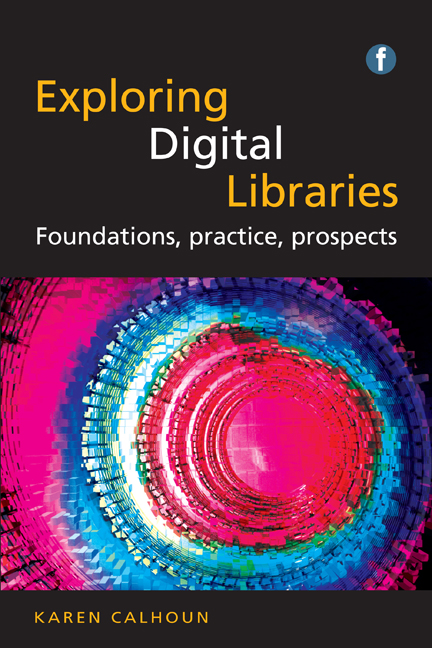Book contents
- Frontmatter
- Dedication
- Contents
- List of figures and tables
- Preface
- Acknowledgements
- Glossary
- 1 Emergence and definitions of digital libraries
- 2 Outcomes of digital libraries’ first decade
- 3 Key themes and challenges in digital libraries
- 4 Digital library collections: repositories
- 5 Hybrid libraries
- 6 Social roles of digital libraries
- 7 Digital libraries and their communities
- 8 The prospects of open access repositories
- 9 Digital libraries and the social web: scholarship
- 10 Digital libraries and the social web: collections and platforms
- References
- Index
7 - Digital libraries and their communities
Published online by Cambridge University Press: 08 June 2018
- Frontmatter
- Dedication
- Contents
- List of figures and tables
- Preface
- Acknowledgements
- Glossary
- 1 Emergence and definitions of digital libraries
- 2 Outcomes of digital libraries’ first decade
- 3 Key themes and challenges in digital libraries
- 4 Digital library collections: repositories
- 5 Hybrid libraries
- 6 Social roles of digital libraries
- 7 Digital libraries and their communities
- 8 The prospects of open access repositories
- 9 Digital libraries and the social web: scholarship
- 10 Digital libraries and the social web: collections and platforms
- References
- Index
Summary
Overview
What sets thriving, long-lived digital libraries apart from those that attract only modest attention or have faded into memory? Why have some digital libraries had a distinctive impact on the communities they were built to serve, while others are more or less ignored? This chapter examines these issues. It builds on Table 2.1's descriptions of a sample of working digital libraries that have been successful since they began in the first decade of digital libraries (1991–2001). It also takes up themes from Chapter 6, which examines the ways that digital libraries produce, or could produce, value for the communities they serve.
Approach
This chapter uses the results of interviews with nine well known digital library experts (listed at the beginning of the book, p. xvi) to approach the question of what makes digital libraries successful in their communities. Interweaving the results of the interviews and the findings of other digital library researchers and practitioners, the chapter examines the distinguishing characteristics leading to long-term viability.
Successful, sustainable digital libraries
When digital libraries were beginning two decades ago, the web was characterized by fairly passive, read-only sites. As the web evolved into a more social space, users came to expect more interactive sites. It stands to reason that when users approach digital libraries, they bring their expectations and experiences from other sites with them. Accordingly, this chapter begins with an analysis from the domain of online communities, which, for the purpose of this discussion, are network-based spaces in which participants communicate and interact, share and contribute content, and build or maintain relationships.
The study of online communities
Alicia Iriberri and Gondy Leroy (2009) offer a life-cycle perspective on online community success. Their often-cited analysis focuses on the evolution of online communities and identifying success factors in each evolutionary stage: inception, creation, growth and maturity (or death). They take the characteristics of several types of online communities into account: support, interest-based, knowledge, gaming and transactionsbased communities.
Iriberri and Leroy's life-cycle model is based upon a comprehensive review of research and practice in the emerging field of online communities – a body of literature that is highly multidisciplinary and growing fast. Unlike much of what has been written, their approach to modeling what attracts and maintains an online community is complex and contextual.
- Type
- Chapter
- Information
- Exploring Digital LibrariesFoundations, Practice, Prospects, pp. 159 - 178Publisher: FacetPrint publication year: 2014



